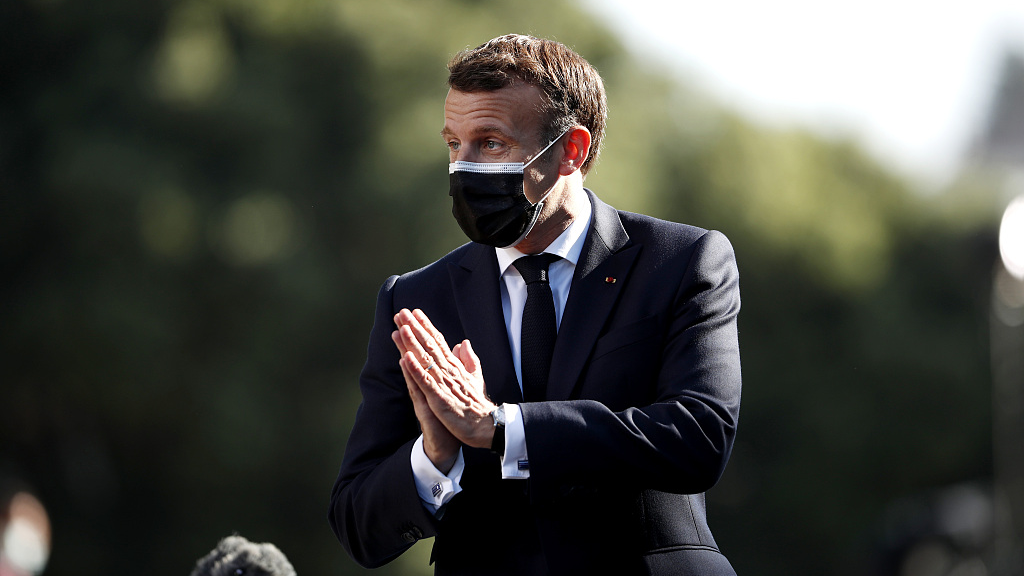
French President Emmanuel Macron. /CFP
French President Emmanuel Macron. /CFP
Editor's note: Jonathan Arnott is a former member of the European Parliament. The article reflects the author's opinions and not necessarily the views of CGTN.
In France, President Emmanuel Macron has been re-elected for a second five-year term as expected. The election was Macron's to lose. Absent a huge blunder by him, Marine Le Pen's only chance to win was to succeed in the sole presidential debate. But she stumbled there.The French citizens remain largely supportive of Ukraine. Macron could attack Le Pen repeatedly, accusing her of harboring "too close" ties with Russia. He cited her comments from 2017 in which she said that Russia was "broadly going in the right direction," and she kept insisting in February this year that Russia would not engage in military actions in Ukraine.
"You're speaking to your banker when you speak about Russia, that's the problem," Macron said during the debate. It was a veiled reference to Le Pen's party having received loans from banks linked to Russia in recent years. He argued that this made Le Pen "dependent" on Russia's government and President Vladimir Putin.
Opinion polling by the French Institute of Public Opinion (IFOP) in March showed that 90 percent of the French were "worried by the war in Ukraine," with the situation overshadowing some of the typical domestic issues. Le Pen would have been more Euroskeptic, more opposed to wind and solar power, keen to lower taxes on fuel and eliminate income taxes for those aged under 30 years old, supportive of a ban on Islamic head coverings, and against increasing the retirement age. Such policies have mixed support from the French, but none of those issues really mattered at the end.
Given the current state of French public opinion, the Russia-Ukraine crisis could explain why President Macron surpassed his opinion poll ratings. He was re-elected by roughly 58 percent to 42 percent. It was a clear victory for him, despite what is likely to be the lowest voter turnout in 50 years and Macron's poor approval ratings.

Screens displaying the projected results after the close of polling stations in the first round of the French presidential election in Toulouse, southwestern France, April 10, 2022. /CFP
Screens displaying the projected results after the close of polling stations in the first round of the French presidential election in Toulouse, southwestern France, April 10, 2022. /CFP
President Macron believed that a tougher stance on Russia would provide political "clear blue water" between himself and Le Pen. Just two days ago, Paris announced its intention to deliver additional weapons and military hardware to Kiev.
Additionally, France will remain in election mode as parliamentary elections come soon. French presidents try to avoid what is known as "cohabitation," the situation where the parliamentary arithmetic produces a prime minister from an opposing political party to the president. France will remain in election mode until June.
Meanwhile, France and Germany are both facing criticisms from the European media. They face accusations of not doing enough for Ukraine. Even so, Volodymyr Zelenskyy will feel much happier with the outcome of this election. Kiev is hoping that Western international pressure could push France into more proactive support for them.
Few presidents in the country have gone on to be re-elected and stay popular in their second terms. He is likely to be an unpopular second-term president, having only won re-election on account of a weak opposition party. Even small amounts of military assistance to Ukraine will be made with fanfare, but it is likely to remain more hands-off than the United States and United Kingdom.
Western leaders will no doubt be happy with election results. They considered Le Pen to be too "far-right," someone who would have been disruptive to the European Union's consensus. And if there is one thing that politicians seem to prize in these uncertain times, it is stability.
President Macron may struggle to connect with ordinary voters, but he is very much at home when speaking to his counterparts in other European nations. Outside the political bubble, Macron's own voters will be relieved but even they are not enthused about the election results in the country.
(If you want to contribute and have specific expertise, please contact us at opinions@cgtn.com. Follow @thouse_opinions on Twitter to discover the latest commentaries on CGTN Opinion Section.)

